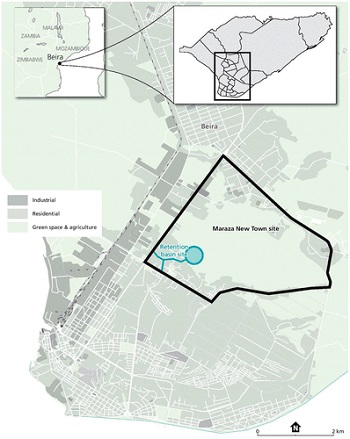On whose land is the city to be built? Farmers, donors and the urban land question in Beira city, Mozambique
 A new era of global interventionism in African cities is emerging, the implications of which for existing claims to urban space are poorly understood. This is particularly true for the claims of farmers. Despite being a ubiquitous feature of many African cities, urban agriculture broadly exists in a conceptual limbo between rurality and urbanity, largely invisible to urban governance and substantive scholarship. Based on the case of Beira, Mozambique, in this article we make urban agriculture empirically and conceptually visible within the context of emerging debates on the urban land question in Africa. Through a historical–political analysis, we demonstrate how urban farming has constituted a distinct feature of Beira’s urbanism, which has evolved amidst successive and contradictory state-land regimes. Moving to the present day, we demonstrate how a new urban regime has emerged out of a coalition of municipal leaders and international donors with the aim of erasing all traces of urban agriculture from the city through urban ‘development’. The findings demonstrate that there is a need for a better understanding of the manifold claims to urban space, outside of slum urbanism alone, in contemporary land rights debates. We conclude by arguing that there is a need for a substantive land rights agenda that transcends the prescriptive categories of urbanism and rurality by focusing instead on the universal land question. Illustration from the article: Location of the retention basin and Maraza New Town developments in Beira city. Green space and agriculture refer here to a generic category of undeveloped land, which includes but is not limited to areas used for agriculture.
A new era of global interventionism in African cities is emerging, the implications of which for existing claims to urban space are poorly understood. This is particularly true for the claims of farmers. Despite being a ubiquitous feature of many African cities, urban agriculture broadly exists in a conceptual limbo between rurality and urbanity, largely invisible to urban governance and substantive scholarship. Based on the case of Beira, Mozambique, in this article we make urban agriculture empirically and conceptually visible within the context of emerging debates on the urban land question in Africa. Through a historical–political analysis, we demonstrate how urban farming has constituted a distinct feature of Beira’s urbanism, which has evolved amidst successive and contradictory state-land regimes. Moving to the present day, we demonstrate how a new urban regime has emerged out of a coalition of municipal leaders and international donors with the aim of erasing all traces of urban agriculture from the city through urban ‘development’. The findings demonstrate that there is a need for a better understanding of the manifold claims to urban space, outside of slum urbanism alone, in contemporary land rights debates. We conclude by arguing that there is a need for a substantive land rights agenda that transcends the prescriptive categories of urbanism and rurality by focusing instead on the universal land question. Illustration from the article: Location of the retention basin and Maraza New Town developments in Beira city. Green space and agriculture refer here to a generic category of undeveloped land, which includes but is not limited to areas used for agriculture.
Read the full article (Open Access).
This article was published in Urban Studies,
https://doi.org/10.1177/0042098020929237.

